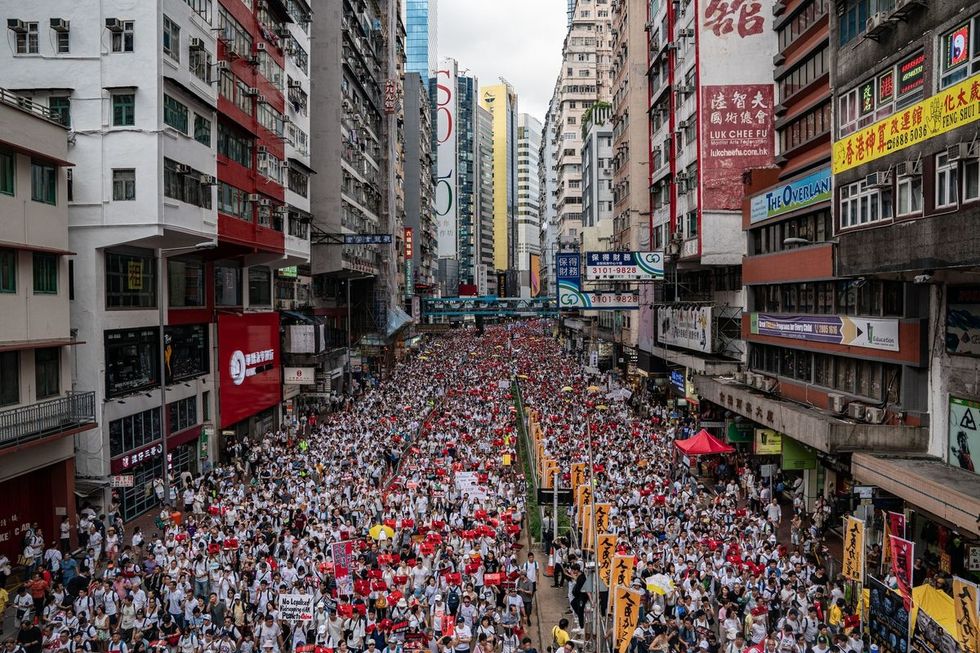Over the last few months, Hong Kong's massive pro-democracy protests have made headlines around the world, and have become one of the most important world events of 2019. By fighting for democracy and freedom and against the oppressive government of mainland China, Hong Kong's protesters have garnered support from all over the world. The protests started out peaceful, but have taken a dire turn in the last two months. Tourists and businesspeople alike are fleeting Hong Kong, which is seriously impacting the city on a whole. To protect their freedoms and ensure their city's survival, Hong Kongers must stop protesting-now.
In 2018 a Hong Kong man murdered his girlfriend in Taiwan, and fled back to Hong Kong before Taiwanese authorities could arrest him. As a result, Hong Kong's legislature passed an "extradition bill", which would allow suspects in Hong Kong to be transferred to Taiwan and mainland China to face trial. The bill was simply meant to prevent Hong Kong from becoming a sanctuary city for criminals. But a loophole in the bill could allow political dissidents in Hong Kong to be tried in mainland China, effectively allowing mainland Chinese law to be enforced in Hong Kong. Many Hong Kongers, especially students, were rightfully enraged by this, and took to the streets in protest.
When the mass protests started in early June of this year, they were peaceful and orderly. Hundreds of thousands of mostly young Hong Kongers took to the streets, and Lennon Walls popped up across the city with heart-touching messages of support. In one instance, thousands of protesters parted like the Red Sea for an ambulance. As a result, Hong Kong's protesters were praised internationally, including bipartisan support in the US. Even though I was born in mainland China, I started supporting the protesters. They clearly fought for a cause they believed in, and did so with extraordinary civility.

Over the coming weeks and months, the demands of Hong Kong's protesters were slowly met. Despite being viewed by many as a puppet of China's Communist Party, Hong Kong's chief executive, Carrie Lam, has proven her dedication to place Hong Kong first. Not long after the protests started, she suspended the controversial extradition bill indefinitely in hopes of calming protesters' fears. However, this did little to appease them. As a result, she completely withdrew the bill in September, despite opposition from the Chinese government. The protesters should be thanking her for this courageous action. Yet they continue to demand her resignation, saying her actions were too little, too late. They seem to hate her not because of her actions, but simply because she is Carrie Lam.
Despite their chief objectives being met, Hong Kong is showing no signs of returning to order. Instead, the protests have only gotten increasingly violent and disruptive. On July 1st, protesters vandalized the government complexes. Many were arrested, which led to chants of police brutality. On August 5th, protesters organized a citywide general strike and disrupted major roads and MTR services, effectively bringing the city to a halt. Just one week later, thousands of protesters stormed Hong Kong International Airport, rendering the airport inoperable and stranding thousands of travelers, including me. The very next day they stormed the airport again, shutting it down for the second day in a row. SWAT teams were dispatched to restore law and order, which only increased tensions between protesters and police. By September, protesters were vandalizing MTR stations and setting station entrances on fire, seriously disabling the world-class transit system. And in October, they reached an all time low. They shut down the entire MTR system for an entire day, once again setting stations and even a train on fire. They love their city so much that they ransacked it and turned it into a wasteland.

In just four months, Hong Kong has become a literal war zone, and people have been fleeing. Airlines are suspending flights to the city. Tourism is at an unprecedented low; tourist hotspots are deserted, and hotels and restaurants are struggling to survive. In fact, rates at some hotels are now cheaper than rents in Hong Kong's infamous cage homes. Once the economic powerhouse of China and the entire Asia Pacific region, Hong Kong is now a reign of terror.

I strongly believe in the fundamental principles of democracy, freedom and human rights, However, I cannot support Hong Kong's ongoing protests. The ongoing violent protests demonstrate the protesters' complete lack of concern for the needs of the general public and Hong Kong on a whole. Furthermore, it shows their disrespect for one of democracy's most fundamental pillars: rule of law. When China regained Hong Kong in 1997, they respected Hong Kong's autonomy because of its stable, democratic government and enormous economic power. Back then, it made up over 20% of China's GDP. Today it makes up only 3% of China's GDP, and this reign of terror will only plummet that number and tighten China's grip on the city.
If Hong Kong's protesters love their city and want to ensure its survival, they must stop protesting now. Only then will China realize the importance of Hong Kong's economy and appreciate Hong Kong's unique blend of East and West. Only then will tourists and businesses return to Hong Kong, reviving the city and its economy. I sincerely hope Hong Kong will continue to be a world-class city for tourism and business alike, and a beacon of democracy and freedom in China. However that can only happen if Hong Kong realizes the importance of law and order, and if its protesters take a much-needed rest. Then, Hong Kong will slowly but surely return to order, once again reaching its full potential and regaining its status as one of the world's most modern, cosmopolitan, and powerful cities.












